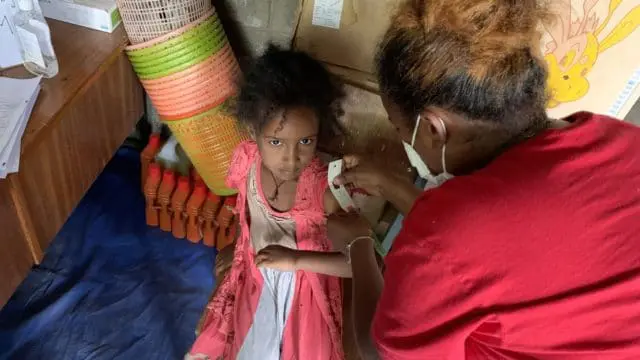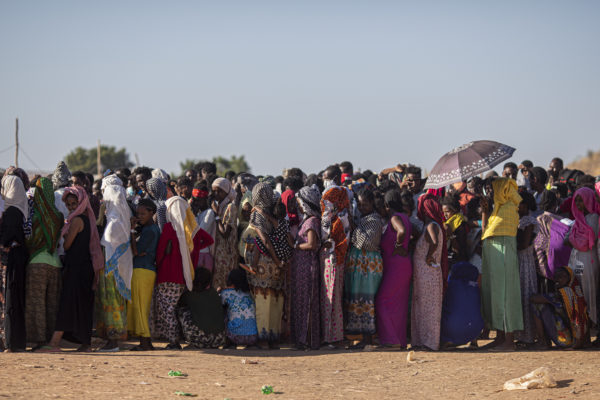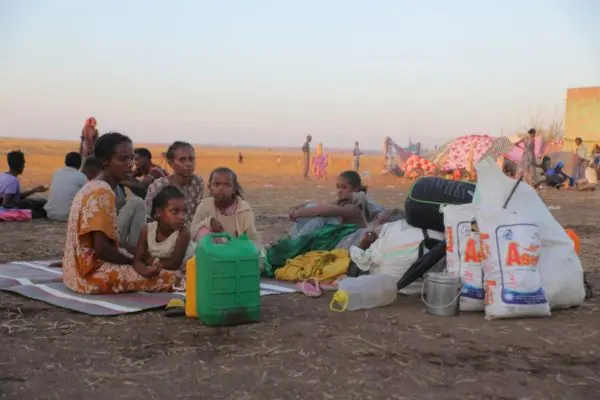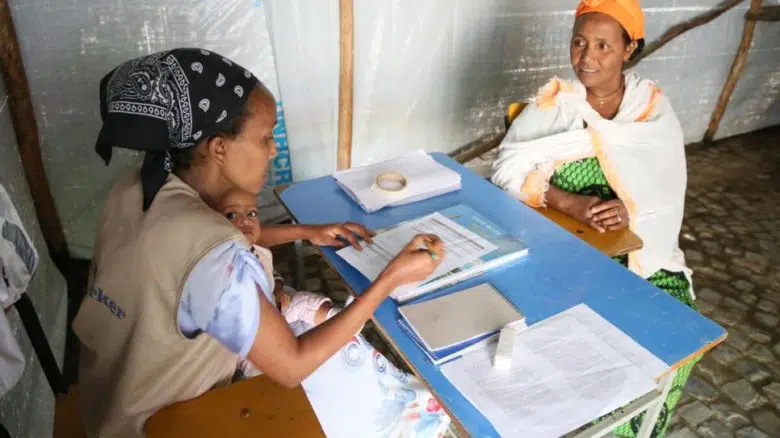
Mebrat, 32, works as a social worker, supporting people displaced by the Tigray conflict in Mekelle, Ethiopia.
© UNHCR/Olga Sarrado Mur
A network of over 100 Ethiopians displaced by the conflict in the north of the country is supporting others to recover from trauma and access basic services.
By Olga Sarrado in Mekelle, Ethiopia
The pain and trauma that Mebrat experienced when she fled her home has helped her in her current role as a social worker, making her better understand the plight and needs of the people she assists.
The 32-year-old mother of three never imagined she would become a symbol of hope, trust and strength for displaced Ethiopians who have found refuge in a health centre in Mekelle, the capital of the Tigray region.
“Some people tell me they can’t sleep at night. They have flashbacks of what they saw as they escaped,” she said. “I think they confide in me because I am friendly and I understand what they have been through.”
She was forced to flee her home ten months ago by truck, then on foot, walking for five days until her shoes wore out, hiding in villages and sleeping on the road with no food or money.
Today, she is using her pain to help others and she finds that it helps her do her job well.
“Sometimes, we just cry together.”
For the past three months, she has been working at a protection desk set up by UNHCR, the UN Refugee Agency, in the site which has become a haven for many.
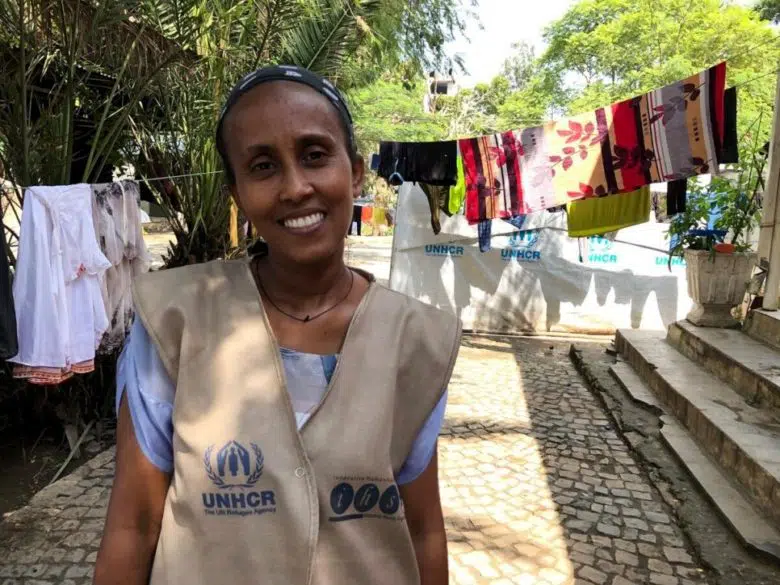
Mebrat, 32, is one of over 100 social workers providing support and counselling to people displaced by the Tigray conflict in Mekelle, Ethiopia. © UNHCR/Olga Sarrado Mur
“People of all ages come to ask for food, diapers, sanitary napkins, milk,” she said. “By helping them, we are ensuring that everyone gets the support they need most.”
In Northern Ethiopia, the fighting over the last 12 months has created a humanitarian crisis that has forced millions to flee their homes in search of safety. Up to 8 million people urgently need food, water and other aid. The conflict has made it increasingly difficult to reach people in need, as security conditions in some areas continue to deteriorate.
Mebrat receives about ten visitors daily and keeps the small room where the protection desk is housed clean and tidy.
“I advise them based on my experience. I am honest with them and I tell them they are not alone. Sometimes, we just cry together,” she said.
Her background is in business management – a profession she worked hard at for years.
“I came from a poor family so I would sell tea in the morning and study at night. But with hard work, I built a family and became a professional,” she said proudly.
“Social workers really support the physical and mental wellbeing of the displaced.”
In addition to distributing blankets, kitchen utensils and shelter materials to internally displaced people (IDPs) in the Amhara, Afar and Tigray regions in northern Ethiopia, UNHCR has set up a network of more than 50 protection desks, which are accessible to over half a million IDPs – with plans to expand to meet new displacement needs. Social workers like Mebrat serve a crucial role, linking them with service providers including humanitarian agencies.
“Social workers are very close to the community, and we value their presence as they really support the physical and mental wellbeing of the displaced,” said Seda Kuzucu, UNHCR’s Senior Emergency Coordinator.
She explained how they help improve the humanitarian response by identifying needs and gathering relevant information which is useful in referring urgent cases for assistance.
“They provide a form of psychological first aid as many people are suffering from depression and anxiety due to the trauma they underwent, and the stress of an uncertain future.”
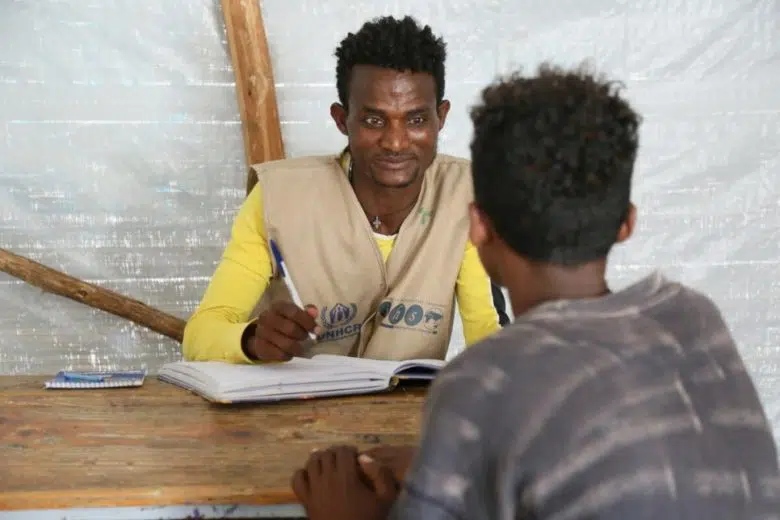
Teklit, 29, works as a social worker at a site hosting thousands of Ethiopians displaced by the Tigray conflict in Mekelle, Ethiopia. © UNHCR/Olga Sarrado Mur
Like Mebrat, Teklit fled his home with his wife and two-year-old son. He lost friends on the way, witnessed killings, escaped shelling, spent nights hiding in the bush and walked for days in search of safety. But in his current role, he has found new hope.
“I wanted to help solve the problems of my community. This work is also helping me sustain my family and I keep learning every day,” he adds.
His experience in sports is making a difference as he keeps people, especially the youth, engaged through football and volleyball tournaments.
“I developed skills as a sports teacher that I am now putting into practice,” he said. “I used to tell my students to live for today and not to worry about tomorrow. No matter how hard the situation is, it will pass. I believe it deeply and I try to pass that message on to my community.
Teklit has become like a big brother to some 25 unaccompanied and separated children hosted at the site.
“I help identify the best way they can be assisted but the most important thing is to keep them busy and active. We play sports, we laugh, we dance. This is what fulfils me the most,” he said
His wife is his greatest supporter.
“When I am stressed, she advises me. She is my social worker!” he said with a laugh.
“We play sports, we laugh, we dance. This is what fulfils me the most.”
Although the social workers do as much as they can, they agree that it can be frustrating to not be able to do more.
Subscribe to UNHCR’s mailing list
“Our work is very challenging as we don’t always have the answers,” Mebrat said. “Sometimes people just want food, which we don’t have enough of. However, we do our best to ensure that any form of humanitarian aid reaches those most in need.”
They are encouraged by the critical role they play.
“This work helps me too as I have also suffered a lot. It reminds me I am still alive and healthy and I can help my community,” adds Mebrat said.
She dreams of returning home when there is peace.
“Peace is important for all of us to recover fully. With peace, I know I can achieve anything I want and I will have a brighter future.”
Originally published by UNHCR on 17 November 2021.



